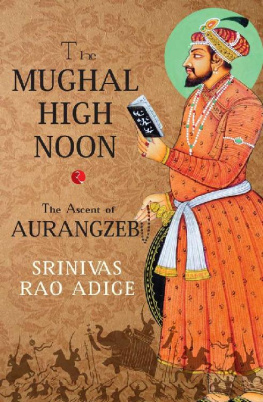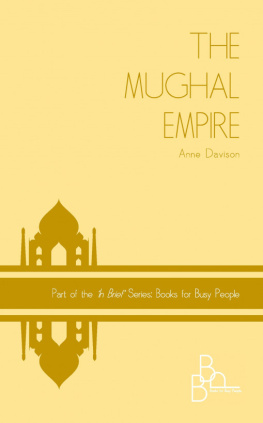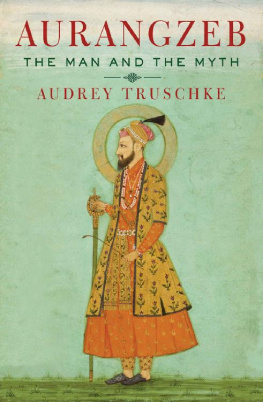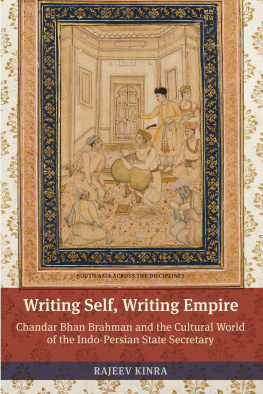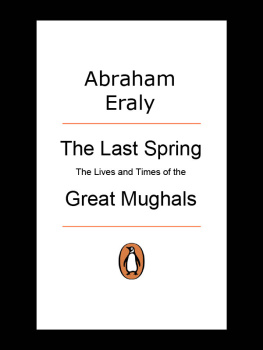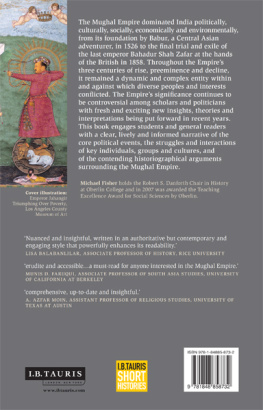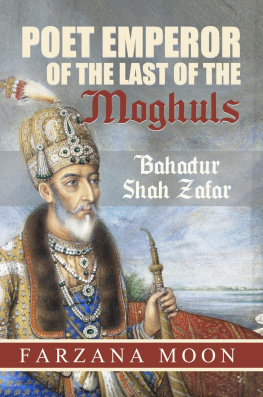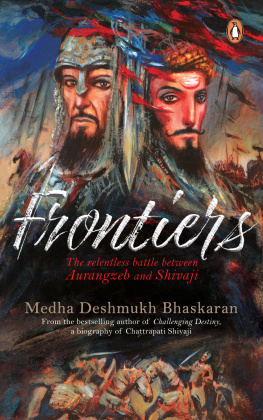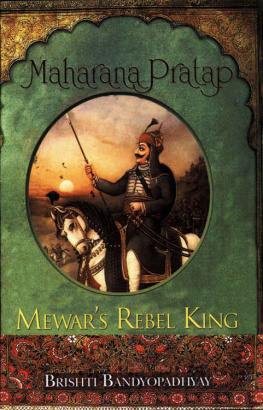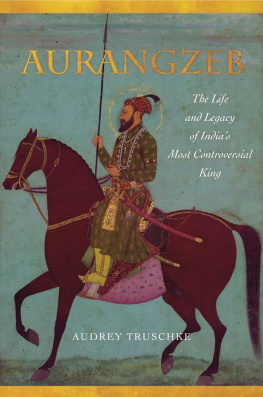
Srinivas Rao Adige, educated at the Doon School, Dehradun and St Stephens College, New Delhi, has worked for the Indian Administrative Service. A keen student of Indian history, he combines his passion for the past with his flair for writing. Adige is married and lives in New Delhi.
The Mughal High Noon is his first novel.

Published by
Rupa Publications India Pvt. Ltd 2016
7/16, Ansari Road, Daryaganj
New Delhi 110002
Copyright Srinivas Rao Adige 2016
This is a work of fiction. All situations, incidents, dialogue and characters, with the exception of some well-known historical and public figures mentioned in this novel, are products of the authors imagination and are not to be construed as real. They are not intended to depict actual events or people or to change the entirely fictional nature of the work. In all other respects, any resemblance to persons living or dead is entirely coincidental.
All rights reserved.
No part of this publication may be reproduced, transmitted, or stored in a retrieval system, in any form or by any means, electronic, mechanical, photocopying, recording or otherwise, without the prior permission of the publisher.
eISBN: 978-81-291-3904-7
First impression 2016
10 9 8 7 6 5 4 3 2 1
The moral right of the author has been asserted.
This book is sold subject to the condition that it shall not, by way of trade or otherwise, be lent, resold, hired out, or otherwise circulated, without the publishers prior consent, in any form of binding or cover other than that in which it is published.
To Andr and Urshila
Table of Contents
One
I T WAS THE middle of the monsoon season. The light breeze that had been blowing since the afternoon had dropped and not a leaf stirred. Dark clouds hung over the imperial city of Delhi. Along its eastern fringes, the waters of the River Jamuna, heavy and swollen at that time of the year from the melting snows of the Himalayas and the monsoon rains, flowed past the massive sandstone walls of the Red Fort, the Quilla-e-Mualla or Exalted Fort, seat of the Mughal emperor Shah Jahan and nerve centre of his empire. Dusk had fallen and amidst the scent of flowers in the gardens surrounding the various exquisitely designed courtyards and pavilions within the fort, the lamp lighters were going about their business, illuminating the corridors and passageways with lighted torches and diyas. In an opulent apartment within a palace in the northern precincts of the fort, Prince Dara Shukoh, the eldest son and heir apparent of the Emperor, sat facing his eldest sister and First Lady of the court, Jahanara Begum. They were talking in low whispers, as if they feared the very walls would hear them.
The old goat, he knows nothing, remarked Jahanara Begum, in disgust.
Dara Shukoh looked shocked and said, How can you say that? Dont forget, Hakim Allauddin Mirza has fifty years of experience behind him, and hes been treating the royal household since the days of our respected grandfather.
It was the tenth day since the Emperors first seizure. The Hakim and his team of physicians were toiling with increasing desperation to cure the Emperor, but with little success. He had not responded to the treatment and his condition had worsened. Swelling had developed in the lower limbs, the throat and palate remained parched, and the body was wracked with high fever. Not a morsel of nourishment had passed through the Emperors gullet in the last four days, and he lay listlessly upon his bed in the khwabgah, occasionally groaning in pain.
One years experience multiplied fifty times doesnt make fifty years of experience, said Jahanara tartly, creases furrowing her forehead. The first seizure which had occurred ten days ago was ascribed to the varak in the zafrani pulao our revered father had consumed the night before he fell ill, the second seizure to strangury and this recent seizure to fluxions in the bowels, but it is clear that his treatment is not working as the attacks are becoming increasingly severe.
Dont you think it is too early to lose faith in the treatment? After all, these medicines take time to work. The Hakim has added a course of bloodletting recently, besides tying a specially consecrated amulet, brought from the dargah of Hazrat Nizamuddin Auliya, to fathers upper arm, said Dara tentatively, who always felt a little inadequate before his masterful sister. After all, it was she who had taken over the responsibilities of the First Lady of the court after the death of their mother, Mumtaz Mahal, despite the existence of the Emperors other three wives.
Too early did you say? Not only has there been no durbar since the Persian Ambassadors accreditation ceremony on the morning of the first seizure, but for the last four days he has been too ill even to leave the bed or take nourishment. Meanwhile, the court is in complete disarray. Many bazaars have closed down, shops have remained shut fearing breakdown of order, and all sorts of wild rumours are circulating in the city and even beyond, including one that the Emperor is no more.
God forbid! Well personally tear out the tongues of all those who spread such rumours, said Dara vehemently, as his hand flew to the hilt of his sword. In fact, it is to prevent such rumours that we have restricted the access to His Majesty, limiting it to a very few trusted officials, and have also mounted watch on our brothers agents in court.
Jahanara didnt say anything immediately. The unspoken truth of the power struggle between the four sons of the Emperor weighed heavily between them.
Perhaps, it is these very restrictions that are causing such rumours to circulate. If more courtiers were allowed access to the Emperor, the people would know the truth that while no doubt he is ill, he is very much alive. That is a matter for you to think over. However, we came here for a different reason, said Jahanara. She barely noticed Daras broad forehead, his lively, intelligent eyes, the long, straight nose, and the generous mouth, but with a chin which, though partially concealed by his beard, receded and betrayed more than a hint of irresolution and indecisiveness.
What is that?
We think it is time we stopped relying on the Hakims treatment alone, and took a second opinion.
Dara was taken aback by the suggestion. We could try Hakim Shaukat Aziz, he said. He was not very comfortable with Jahanaras suggestion, but did not want to reject it summarily for fear of offending her, knowing her closeness to the Emperor. They say he has a roaring practice. Of course, Mirza Saheb will not like it. You know how these hakims are.
Were least concerned with Mirza Sahebs likes or dislikes. Our foremost task is to see that our beloved father recovers swiftly and completely. We feel the course of bloodletting that has been prescribed will weaken the Emperor even further. No, we were thinking of someone else.
Who do you have in mind?
Well tell you, Jahanara whispered. Discreetly throwing a look around them, she continued, One of our ladies-in-waiting is Kunwarani Gayatri, granddaughter of Thakur Bhoor Singh of Kalumbar. She told us that her grandfather, who was suffering from the same symptoms, has been cured under someones medical treatment.
If that is so, who is this man? Lets send for him at once, said Dara, eagerly.
Hes a Hindu, a Brahmin pandit. His name is Ravi Kumar Vaid.
Dara was stunned. A vaid? he said, his face aghast. A non-believer? Do you know what you are saying? How can you even think of having the Emperor treated by a Hindu? Have you considered the political implications of it? If we agree to seek his counsel, and God forbid, suppose something untoward happens, all the ulema and members of the court would be up in arms against us. Only our enemies in court would rejoice. And remember our brothers; Murad in his viceroyalty in Gujarat remains too much in his cups to create trouble and Shuja in Bengal is too far away, but it is Aurangzeb in the Deccan, whom were most apprehensive about. He will stop at nothing to turn the situation to his advantage. After a pause he continued, his eyes narrowing, And just how did this kunwarani come to know the symptoms of our fathers illness? We thought it was a well-kept secret after all the precautions that had been taken.
Next page
